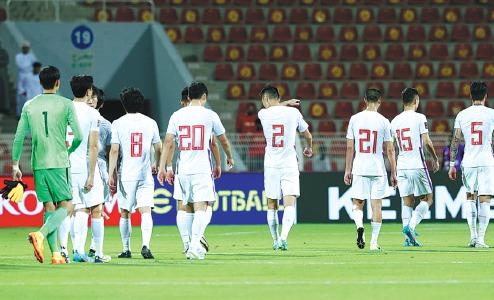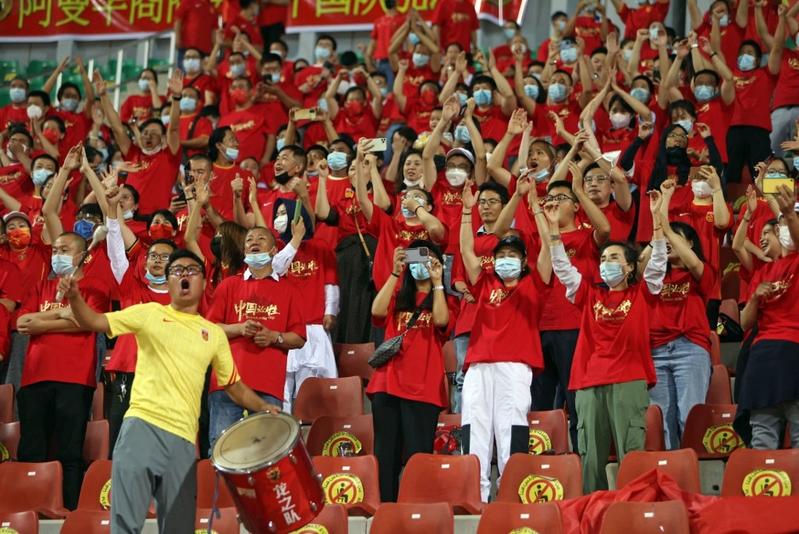 Demoralized Team China players trudge off the pitch following their 2-0 World Cup qualifying defeat to Oman in Muscat on March 29, 2022. The loss saw China finish fifth in Group B, with a paltry six-point total from 10 games. (PHOTO / XINHUA)
Demoralized Team China players trudge off the pitch following their 2-0 World Cup qualifying defeat to Oman in Muscat on March 29, 2022. The loss saw China finish fifth in Group B, with a paltry six-point total from 10 games. (PHOTO / XINHUA)
Team China's World Cup qualification campaign ended with a whimper on Tuesday, leaving fans struggling to find any positives from another dismal performance as the country's wait for a first appearance at soccer's showpiece since 2002 goes on.
A 2-0 defeat to minnow Oman showed just how far Chinese soccer has declined in recent years, and suggested the team faces a long road ahead to return to Asia's elite ranks.
With both teams' chances of reaching the 2022 World Cup in Qatar long gone, only pride was at stake for China and Oman in their final Group B fixture in Muscat.
And it was the host who showed the greater intent in that regard, dominating from the first whistle to the last, and registering four shots on target from 11 attempts. A damning stat of zero shots on target for Team China said it all about the visitor's pitiful performance.
With only six points (one win and three draws) from its last 10 qualifiers, Team China finished fifth in the six-team Group B, far behind the top two automatic qualifiers, Saudi Arabia and Japan, and nine points adrift of third-place Australia which now faces a playoff against the United Arab Emirates.
With only six points (one win and three draws) from its last 10 qualifiers, Team China finished fifth in the six-team Group B, far behind the top two automatic qualifiers, Saudi Arabia and Japan, and nine points adrift of third-place Australia which now faces a playoff against the United Arab Emirates
Sports commentator Han Qiaosheng summed up the mood of Chinese fans, writing on Weibo: "Team China managed zero shots on target against Oman, concluding their World Cup qualification journey with an embarrassing performance.
"I think before the start of the final phase of Asian zone qualification, no fan would have expected Team China to have such a result.
"But this is the reason why the squad has sunk so low: We need to admit that China's soccer development has major problems.
"Some fans joked years ago that if there could be 48 teams in the World Cup finals, then Team China might have a chance of qualifying. But, given their current form, even if there were 64 teams in the finals, there still would be no spot for the Chinese men's team."
Team China head coach Li Xiaopeng said he could not fault his players' effort, but admitted they lacked quality.
"We're simply not good enough. The players have tried hard, and I think they have put in a lot of hard work over the last two years. They need to process this result, move on and prepare for their next league matches," said Li.
"I think the players have courage, and they showed the will to attack. Compared with the previous qualifiers, we did not just defend and we attacked more. But still the overall performance is not satisfactory.
"We will regroup and take things step by step. We will continue to call up our best players to the national team, and obviously we still need to keep working hard."
ALSO READ: Coach Li asks players to 'cherish' last WC qualifier against Oman

China's supporters cheer in the stands during the 2022 Qatar World Cup Asian Qualifiers football match between Oman and China, at the Sultan Qaboos Sports Complex in the Omani capital, on March 29, 2022. (MOHAMMED MAHJOUB / AFP)
Rocky road
With Italian World Cup winner Marcello Lippi at the helm, China kicked off its qualifying campaign with a 5-0 triumph over the Maldives in September 2019. However, a 2-1 defeat to Syria two months later prompted Lippi to call time on his second stint in charge, with Li Tie installed as the Italian's successor in January 2020.
Despite challenges presented by the COVID-19 pandemic, former Everton midfielder Li Tie enjoyed some initial success, helping Team China secure a place in the final phase of Asian zone qualifying thanks to a 3-1 victory over Syria in Sharjah in June last year.
However, China repeatedly struggled against stronger teams in the final phase, and in December, the Chinese Football Association (CFA) accepted Li Tie's resignation amid heavy criticism of the head coach, with Wuhan FC head coach Li Xiaopeng appointed as his replacement.
"Frankly speaking, Li Xiaopeng caught a hot potato from Li Tie, and this was never going to be an easy job. It's not about trust issues with the coach or about the coach's personal ability. It's actually more about timing," read a commentary from Titan Sports' Ma Dexing. "It's not easy to unite Team China under these circumstances. Just like many pundits predicted, Li Xiaopeng couldn't lead Team China to a single win in the last four qualifiers.
"Where is the hope? And what does the future hold for this team? Even if Team China played Oman and Vietnam 10 more times, I'm not sure we would win a match."
For years, numerous solutions have been proposed to lift Chinese soccer out of the doldrums-better youth training, improving the domestic leagues, and encouraging young talents to test themselves by playing in more competitive foreign leagues.
However, attempts to improve the domestic leagues have been curtailed by the effects of the COVID-19 pandemic and clubs' recent financial problems, according to former Team China and Manchester City star Sun Jihai, who is now a member of the national squad's coaching staff.
Introducing naturalized players to the national team has also been touted as a way to improve the squad's quality-but while the policy's effectiveness is up for debate, it has ultimately fallen short of earning Team China a World Cup ticket.
READ MORE: China holds Saudi Arabia in FIFA World Cup Asian qualifiers
Moreover, naturalized forwards Ai Kesen (aka Elkeson), Luo Guofu (aka Aloisio), Fei Nanduo (aka Fernandinho) and Alan have all terminated their contracts with Chinese Super League club Guangzhou FC, thereby putting their international futures in doubt. It remains unclear if the CFA will persevere down the naturalization route, with many observers now urging the squad to trust in homegrown youth players.
"As a young player, I still need to improve a lot and need to shoulder more responsibilities. So, I hope my generation of players can develop fast enough and achieve the goals we are not able to achieve now," said 21-year-old Chinese defender Zhu Chenjie. "I hope the younger kids can keep their love and passion for soccer."


